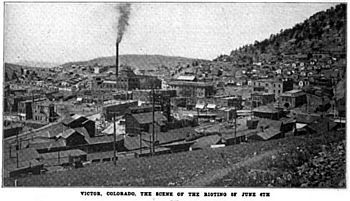Colorado Labor Wars facts for kids

"Victor, Colorado, The Scene Of The Rioting Of June 6th", c. 1904.
|
|
| Date | 1903–1904 |
|---|---|
| Location | Colorado, United States |
The Colorado Labor Wars were a time of big disagreements in Colorado between 1903 and 1904. These conflicts mostly involved miners and mill workers who dug for gold and silver. They were part of a group called the Western Federation of Miners (WFM).
These events were very important because of the serious conflicts that happened. The state government even sent the Colorado National Guard to stop the strikes.
Contents
What Were the Colorado Labor Wars?
The Colorado Labor Wars were a series of strikes. A strike is when workers stop working to demand better pay or working conditions. Miners and mill workers in Colorado wanted better treatment.
These strikes happened in different mining areas across the state. They led to many tough situations between the workers and the mine owners.
Why Did Workers Strike?
Miners and mill workers often faced difficult and dangerous jobs. They worked long hours for low pay. They wanted safer conditions and fair wages.
The WFM was a union that helped these workers. Unions try to get workers to join together. This gives them a stronger voice to ask for changes.
Who Was Involved in the Conflicts?
Many different groups were part of the Colorado Labor Wars. The main groups were the miners and their union, the WFM. On the other side were the mine owners.
The state government also played a big role. Most of the time, the government sided with the mine owners. They often used the Colorado National Guard to end the strikes.
The Role of the National Guard
The National Guard is a military force that states can use. During these wars, they were called in to keep order. They often helped the mine owners break up the strikes.
Private Detective Agencies
Some mine owners also hired private detective agencies. Groups like the Pinkertons and Baldwin-Felts were used. They were often brought in to protect company property and stop union activities.
Citizens' Alliances
There were also groups called Citizens' Alliances. These groups were usually made up of business owners. They supported the mine owners and opposed the strikes.
Where Did the Strikes Happen?
The labor wars took place in several key mining towns and cities in Colorado. These were important places for gold and silver mining.
- Colorado City: Strikes happened here in 1903 and 1904.
- Cripple Creek mining district: This area saw strikes in 1903 and 1904.
- Idaho Springs: Workers went on strike here in 1903.
- Telluride: A strike occurred in this town in 1903.
- Denver: The state capital also experienced labor disputes in 1903.
- Durango: This city had a strike in 1903.
These locations show how widespread the conflicts were across Colorado. The strikes affected many different communities.
The Impact of the Colorado Labor Wars
The Colorado Labor Wars were a very tough period in American labor history. There were many serious disagreements between workers and employers.
Historians have noted that these conflicts were among the most intense. Both sides used strong tactics to try and win. The WFM also became more determined during this time.
The events of 1903 and 1904 changed how labor disputes were handled in Colorado. They showed the challenges workers faced when trying to improve their lives.
 | John T. Biggers |
 | Thomas Blackshear |
 | Mark Bradford |
 | Beverly Buchanan |

